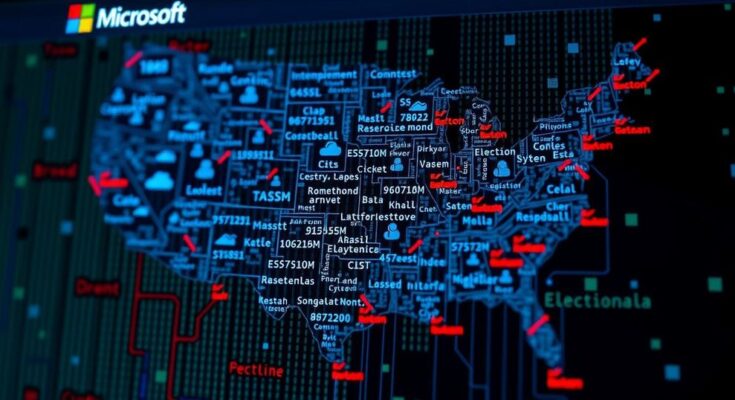Iranian hackers linked to the government have been investigating U.S. election websites, potentially looking for weaknesses to influence the 2024 election, according to Microsoft. U.S. intelligence officials express concern, although no actual hacking attempts have been confirmed. The Iranian group Cotton Sandstorm may increase activity as elections approach, amidst fears of broader foreign interference in the electoral process.
According to a recent report by Microsoft, Iranian affiliates have conducted extensive reconnaissance of election-related websites across several key United States swing states, with potential intentions of identifying vulnerabilities to manipulate the upcoming presidential election. This investigation into the Iranian cyber activities began in April; however, Microsoft’s analysts only recently uncovered the operations. Reports also indicate that these hackers monitored significant U.S. media outlets in May, further raising alarms about their objectives. The U.S. intelligence community has indicated that Iranian efforts are aimed at instigating discord in the context of the 2024 election, particularly through cyber intrusions targeting former President Donald Trump’s campaign and promoting protests against U.S. policies regarding Israel. Microsoft has expressed concerns that the Iranian hacking group, identified as Cotton Sandstorm and linked to the Islamic Revolutionary Guard Corps (IRGC), is likely to escalate its activities as the election period intensifies. The report distinguished that no evidence exists to suggest that the probing of election sites has progressed to actual cyberattacks, and there is currently no threat to the voting integrity of these systems which are fortified by numerous safeguards. Furthermore, U.S. officials and cybersecurity analysts have voiced apprehensions regarding foreign influence aiming to amplify public anxiety over the election processes; for instance, hackers might leak publicly accessible voter registration information to mislead citizens about their access to sensitive electoral systems. Additionally, this concern was echoed in a separate assessment from U.S. intelligence agencies that implicated Russian operatives in propagating harmful audio content detrimental to Democratic figures. The evolving landscape has demonstrated that multiple foreign entities, including Russian, Iranian, and Chinese groups, are intensifying efforts to monitor and potentially sway the electoral outcome nearing the presidential election. Although Chinese interference is less pronounced compared to that of Iran and Russia, it remains influential, as they have been linked to various covert campaigns targeting state and local elections. Chris Krebs, the former head of the Cybersecurity and Infrastructure Security Agency, remarked on the ongoing situation, stating, “I agree with the assessment that we should expect to see more out of Iran, even if it’s hapless and ineffective like their 2020 efforts,” elucidating the notion that while these efforts represent a nuisance, they do not fundamentally alter electoral outcomes. Krebs further advised American voters to prepare for a tumultuous information landscape in the coming months and to maintain focus amid the induced chaos.
The significance of this article stems from the multifaceted challenges posed by foreign cyber entities in the landscape of American electoral integrity. Emphasizing the activities of Iranian-linked hackers, whose reconnaissance of vital election infrastructure raises concerns about potential vulnerabilities, lays bare the current cybersecurity dilemmas facing the U.S. electoral system. Additionally, the intertwining of social media disinformation campaigns and cyber operations underscores the necessity for vigilance against foreign interference, particularly amid a critical election cycle. Understanding these dynamics is crucial for evaluating the impact of cybersecurity threats on democratic processes.
In summary, Iranian hackers have been detected probing U.S. election-related websites, with implications that may affect electoral integrity. Although no actual breaches have occurred yet, the probing activities exemplify broader foreign attempts to disrupt or undermine confidence in the electoral process, necessitating heightened awareness and preparedness among authorities and the electorate alike. The upcoming months will likely witness intensified disinformation campaigns, underscoring the importance of maintaining public confidence in the electoral system.
Original Source: www.cnn.com




